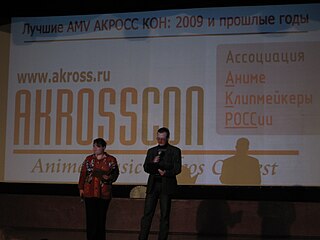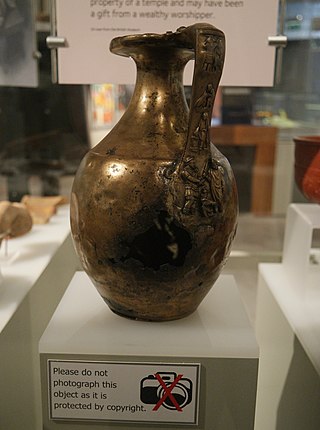Related Research Articles

A copyright is a type of intellectual property that gives the creator of an original work, or another owner of the right, the exclusive, legally secured right to copy, distribute, adapt, display, and perform a creative work, usually for a limited time. The creative work may be in a literary, artistic, educational, or musical form. Copyright is intended to protect the original expression of an idea in the form of a creative work, but not the idea itself. A copyright is subject to limitations based on public interest considerations, such as the fair use doctrine in the United States.

Open-source licenses are software licenses that allow content to be used, modified, and shared. They facilitate free and open-source software (FOSS) development. Intellectual property (IP) laws restrict the modification and sharing of creative works. Free and open-source licenses use these existing legal structures for an inverse purpose. They grant the recipient the rights to use the software, examine the source code, modify it, and distribute the modifications. These criteria are outlined in the Open Source Definition.
Eldred v. Ashcroft, 537 U.S. 186 (2003), was a decision by the Supreme Court of the United States upholding the constitutionality of the 1998 Sonny Bono Copyright Term Extension Act (CTEA). The practical result of this was to prevent a number of works from entering the public domain in 1998 and following years, as would have occurred under the Copyright Act of 1976. Materials which the plaintiffs had worked with and were ready to republish were now unavailable due to copyright restrictions.
Creative Commons (CC) is an American non-profit organization and international network devoted to educational access and expanding the range of creative works available for others to build upon legally and to share. The organization has released several copyright licenses, known as Creative Commons licenses, free of charge to the public. These licenses allow authors of creative works to communicate which rights they reserve and which rights they waive for the benefit of recipients or other creators. An easy-to-understand one-page explanation of rights, with associated visual symbols, explains the specifics of each Creative Commons license. Content owners still maintain their copyright, but Creative Commons licenses give standard releases that replace the individual negotiations for specific rights between copyright owner (licensor) and licensee, that are necessary under an "all rights reserved" copyright management.

Criticism of copyright, or anti-copyright sentiment, is a dissenting view of the current state of copyright law or copyright as a concept. Critics often discuss philosophical, economical, or social rationales of such laws and the laws' implementations, the benefits of which they claim do not justify the policy's costs to society. They advocate for changing the current system, though different groups have different ideas of what that change should be. Some call for remission of the policies to a previous state—copyright once covered few categories of things and had shorter term limits—or they may seek to expand concepts like fair use that allow permissionless copying. Others seek the abolition of copyright itself.
A remix is a piece of media which has been altered or contorted from its original state by adding, removing, or changing pieces of the item. A song, piece of artwork, book, poem, or photograph can all be remixes. The only characteristic of a remix is that it appropriates and changes other materials to create something new.

A Creative Commons (CC) license is one of several public copyright licenses that enable the free distribution of an otherwise copyrighted "work". A CC license is used when an author wants to give other people the right to share, use, and build upon a work that the author has created. CC provides an author flexibility and protects the people who use or redistribute an author's work from concerns of copyright infringement as long as they abide by the conditions that are specified in the license by which the author distributes the work.

An anime music video (AMV) is a fan-made music video consisting of clips from one or more Japanese animated shows or movies set to an audio track, often songs or promotional trailer audio. The term is generally specific to Japanese anime, however, it can occasionally include footage from other mediums, such as American animation, live action, or video games. AMVs are not official music videos released by the musicians, they are fan compositions which synchronize edited video clips with an audio track. AMVs are most commonly posted and distributed over the Internet through AnimeMusicVideos.org, video downloads and YouTube. Anime conventions frequently run AMV contests who usually show the finalists/winner's AMVs.
The Public Domain Enhancement Act (PDEA) was a bill in the United States Congress, first introduced in the United States House of Representatives on June 25, 2003, which, if passed, would have added a tax for copyrighted works to retain their copyright status. The purpose of the bill was to make it easier to determine who holds a copyright, and to allow copyrighted works which have been abandoned by their owners, also known as orphan works, to pass into the public domain.

Free Culture: How Big Media Uses Technology and the Law to Lock Down Culture and Control Creativity is a 2004 book by law professor Lawrence Lessig that was released on the Internet under the Creative Commons Attribution/Non-commercial license on March 25, 2004.

Remix culture, also known as read-write culture, is a term describing a culture that allows and encourages the creation of derivative works by combining or editing existing materials. Remix cultures are permissive of efforts to improve upon, change, integrate, or otherwise remix the work of other creators. While combining elements has always been a common practice of artists of all domains throughout human history, the growth of exclusive copyright restrictions in the last several decades limits this practice more and more by the legal chilling effect. In reaction, Harvard law professor Lawrence Lessig, who considers remixing a desirable concept for human creativity, has worked since the early 2000s on a transfer of the remixing concept into the digital age. Lessig founded the Creative Commons in 2001, which released a variety of licenses as tools to promote remix culture, as remixing is legally hindered by the default exclusive copyright regime applied currently on intellectual property. The remix culture for cultural works is related to and inspired by the earlier Free and open-source software for software movement, which encourages the reuse and remixing of software works.

The free-culture movement is a social movement that promotes the freedom to distribute and modify the creative works of others in the form of free content or open content without compensation to, or the consent of, the work's original creators, by using the Internet and other forms of media.

Students for Free Culture, formerly known as FreeCulture.org, is an international student organization working to promote free culture ideals, such as cultural participation and access to information. It was inspired by the work of former Stanford, now Harvard, law professor Lawrence Lessig, who wrote the book Free Culture, and it frequently collaborates with other prominent free culture NGOs, including Creative Commons, the Electronic Frontier Foundation, and Public Knowledge. Students for Free Culture has over 30 chapters on college campuses around the world, and a history of grassroots activism.

A copyfraud is a false copyright claim by an individual or institution with respect to content that is in the public domain. Such claims are unlawful, at least under US and Australian copyright law, because material that is not copyrighted is free for all to use, modify and reproduce. Copyfraud also includes overreaching claims by publishers, museums and others, as where a legitimate copyright owner knowingly, or with constructive knowledge, claims rights beyond what the law allows.

Free content, libre content, libre information, or free information is any kind of functional work, work of art, or other creative content that meets the definition of a free cultural work, meaning "works or expressions which can be freely studied, applied, copied and/or modified, by anyone, for any purpose."

Copyleft is the legal technique of granting certain freedoms over copies of copyrighted works with the requirement that the same rights be preserved in derivative works. In this sense, freedoms refers to the use of the work for any purpose, and the ability to modify, copy, share, and redistribute the work, with or without a fee. Licenses which implement copyleft can be used to maintain copyright conditions for works ranging from computer software, to documents, art, scientific discoveries and even certain patents.

Code and Other Laws of Cyberspace is a 1999 book by Lawrence Lessig on the structure and nature of regulation of the Internet.
The philosophy of copyright considers philosophical issues linked to copyright policy, and other jurisprudential problems that arise in legal systems' interpretation and application of copyright law.

The public domain (PD) consists of all the creative work to which no exclusive intellectual property rights apply. Those rights may have expired, been forfeited, expressly waived, or may be inapplicable. Because no one holds the exclusive rights, anyone can legally use or reference those works without permission.

Remix: Making Art and Commerce Thrive in the Hybrid Economy is Lawrence Lessig's fifth book. The book was made available for free download and remixing under the CC BY-NC Creative Commons license via Bloomsbury Academic. It is still available via the Internet Archive. It details a hypothesis about the societal effect of the Internet, and how this will affect production and consumption of popular culture to a "remix culture".
References
- ↑ Pushing back against licensing and the permission culture on lu.is (2013)
- ↑ make-art-not-law on ninapaley.com (2013)
- ↑ Lessig, Lawrence. Free Culture. The Penguin Group, 2003.
- ↑ "Copyright, Creative Commons and other Calamities in Scientific Publishing". 10 May 2015. Retrieved 10 May 2015.
- ↑ Masnick, Mike (December 27, 2010). "Permission Culture And The Automated Diminishment Of Fair Use". Techdirt. Retrieved 2012-11-15.
- ↑ Rimmer, Matthew (2007). Digital Copyright and the Consumer Revolution: Hands Off My iPod. Cheltenham, UK [u.a.]: Elgar. pp. 261–262. ISBN 978-1-84542-948-5.